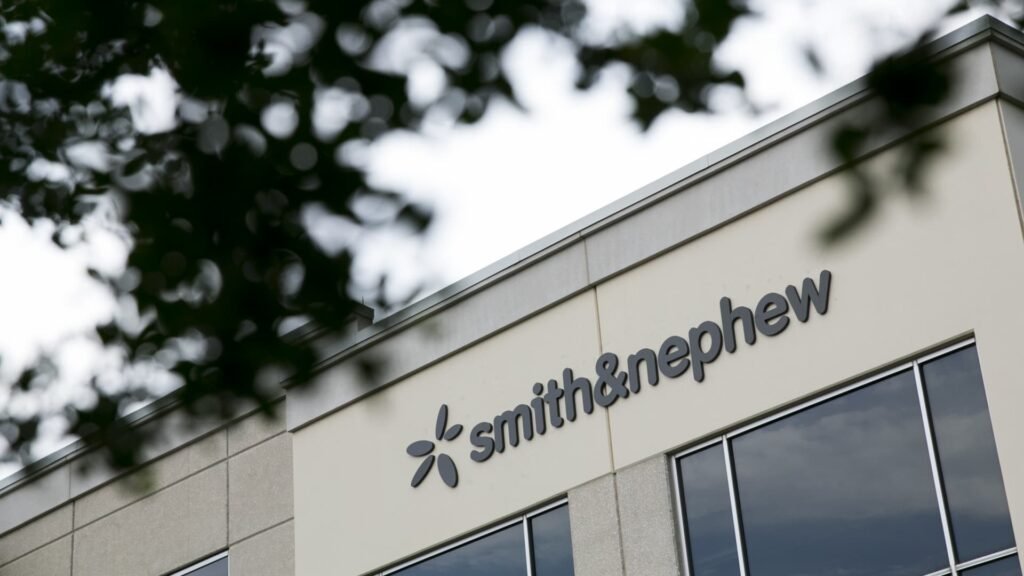A logo sign outside the Smith & Nephew facility in Austin, Texas.
SIPPL SIPA USA | AP
Company: Smith & Nephew (SN.-GB)
work: Smith & Nephew is a British medical technology company operating worldwide. It develops, manufactures and distributes medical devices and services. Its business areas include Orthopaedics, Sports Medicine, ENT and Advanced Wound Management. The Orthopaedics division includes hip and knee implants to replace damaged or worn joints, robotic and digitalised technologies, trauma products to stabilise severe fractures and correct hard tissue deformities. The Sports Medicine and ENT businesses offer advanced products and instruments used to repair or remove soft tissue. The Advanced Wound Management portfolio offers a comprehensive set of products to meet a wide range of complex clinical needs.
Market value: Approximately GBP 9.6 billion (GBP 11 per share). The shares are also traded in the US as American Depositary Receipts, under the ticker “SNN“
Activist: Cevian Capital
Ownership percentage: 5.11%
Average price: £9.68
Activist commentary: Founded in 2002, Cevian Capital is an international investment firm that acquires significant ownership interests in publicly listed European companies where it can enhance long-term value through active ownership. Cevian Capital is a long-term, hands-on owner of European listed companies. The firm is often referred to as a “constructive activist” and is the largest and most experienced active activist investor in Europe. Cevian’s strategy is to help companies improve and become more competitive over the long term, and to benefit through an increase in the real long-term value of the company. The firm’s efforts in companies are typically supported by other owners and stakeholders.
what’s happening
Cevian has acquired a 5.11% stake in Smith & Nephew as it believes it has a fundamentally attractive business, and investors see significant potential gains from improving business performance.
Behind the Scenes
Smith & Nephew is a global leader in medical technology. The company develops and sells medical devices and services in three segments: orthopedics, sports medicine and ENT, and advanced wound management, each of which maintains a leading position in the global market. Smith & Nephew is well known for the quality of its products and has very high brand recognition. Moreover, the company operates in a fundamentally growing and consolidated market with high competitiveness. Generally, industry leaders have stable market shares as well as very predictable customer behavior. The company’s revenues for 2023 are expected to be $5.55 billion, of which 40% will come from orthopedics, 31% from sports medicine, and 29% from wounds. However, the profitability profiles are quite different. After allocating overhead, orthopedics has an operating margin of just 11%, while sports and wounds are double that with an operating margin of 22%.
Despite its market-leading position and favorable industry trends, Smith & Nephew has not created shareholder value for many years, falling 44% since January 1, 2020 and 33% from its post-COVID January 1, 2021 price. This is not surprising and the reason is obvious: the operating margin of its largest business, orthopedics. In 2019, orthopedics operating margin was 23%, but in 2020 it fell to 13%. It is now 11%. This is due to in-house issues related to supply chain management, logistics and manufacturing that result in backorders and implants or necessary tools not being in the right place at the right time. This issue is unique to orthopedics, which is a much more complex business than wound and sports, requiring timely delivery of not only various sizes of implants, components and devices for each procedure, but also the specific tools associated with the procedure. Another major factor in the company’s failure is that Smith & Nephew has experienced significant management turnover over the past five years.
Management has now announced a 12-point plan, a major part of which is to fix Ortho to regain momentum and gain market share. It’s a step in the right direction, and this management team could execute this plan well, but it won’t happen as long as the management turnover continues. It’s impossible to execute a long-term business plan when you have a new CEO every few years. This company clearly needs an activist, but the good news is that Cevian is the perfect activist for a company like this. What Smith & Nephew needs more than anything is long-term thinking and business improvement. Cevian is a long-term activist, with an average holding period of 4-5 years, but often holds positions for 8-10 years. It is focused on business performance. The firm has a long history of helping companies improve their operations as an active shareholder or director. There is no reason why the company can’t raise the operating margins of its orthopedic division to at least pre-pandemic levels, and possibly even higher, to bring it closer to peers like Stryker and Zimmer Biomet.
“We expect Cevian will seek to support this effort at the board level, as it has served on the boards of directors in most of its activist roles. Currently, Cevian professionals serve on the boards of 10 portfolio companies in six countries. Given the firm’s experience and the fact that it is the company’s second-largest shareholder, we expect Cevian to be able to secure a board seat here, either on a friendly basis or by invitation, as it has in most other deals.”
Ken Squire is founder and president of 13D Monitor, an institutional research service on shareholder activism, and founder and portfolio manager of 13D Activist Fund, a mutual fund that invests in the activist 13D investment portfolio.



